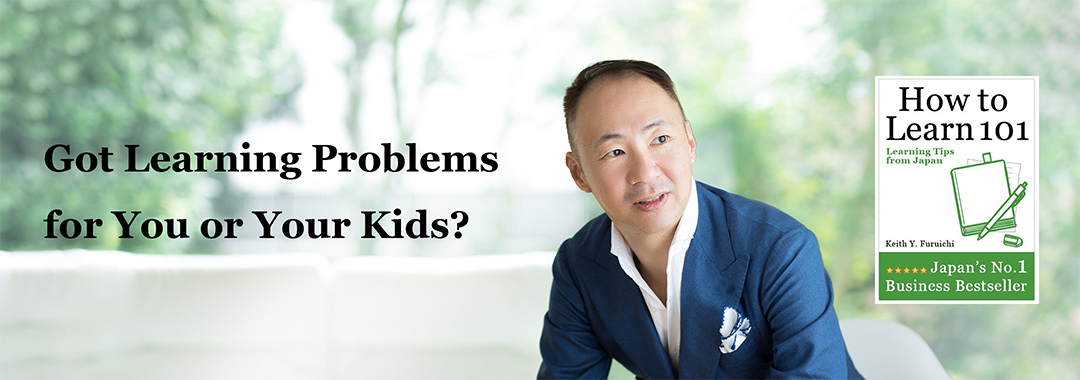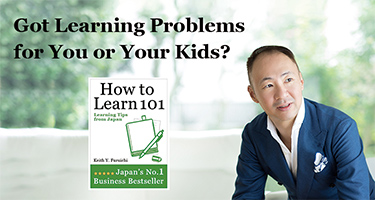



Let me introduce myself and tell you why it was important for me to become a quick learner. My nickname is Keith, which is the name I used while I went to school in the U.S. I work for myself and provide my customers with CDs, DVDs and seminars on learning materials such as personal development and English pronunciation, based on my experiences.
My second book, “Learn to Win,” was published in 2007 and became Japan’s number one business bestseller in 2007 with 480,000 copies sold. To date, over 560,000 hard copies have been sold and a Japanese Kindle version is also available. The book addresses the idea of learning how to learn. I have published several books and over 930,000 copies in total have been sold. The U.S. population is approximately 320 million, about 2.5 times more than that of Japan. The 930,000 copies sold in Japan would be equivalent to 2.3 million copies in the U.S. The books have been published in Korea, Taiwan and China, as well.
I graduated from the State University of New York at Albany, or SUNY Albany, in 2002, where I acquired an MBA. While I was a student there, William D. Danko, Ph.D., co-author of the best-selling “The Millionaire Next Door,” was a marketing professor there. Before going to SUNY Albany, I went to Baruch college, which is part of the CUNY (City University of New York) system in New York City, for two semesters. My English writing class professor, who was in her fifties, once said to me “I don’t get what the hell you’re saying,” after I had asked her a question in class. I got upset, to be honest with you. But then, I realized that I had to improve my pronunciation. Because I had a strong Japanese accent when speaking in English, I often could not make myself clear in conversations. When people did not understand me, I guessed that there was something wrong with my English phrases or grammar. I remember one incident at a hotel when I asked a hotel staff member about a “phone,” and he did not understand me. I had no idea what was wrong. I often guessed in these situations that this might have been some kind of racial discrimination. I was wrong!
I found that some colleges in NYC have accent reduction classes and so I took two classes: a basic one and an advanced one. The Japanese especially have trouble with pronouncing th-, r-, v-, and a-sounds as in “apple.” By taking those two classes, I was able to improve my pronunciation, as well as my listening skills. It is very difficult for the Japanese to distinguish between th- and s- sounds, s- and sh-sounds, r-and l-sounds, and v- and b-sounds. Once I learned how to pronounce these sounds distinctively, I was able to distinguish these sounds clearly. I had high enough scores in TOEFL, or Test of English as a Foreign Language, to be accepted by CUNY Baruch, but speaking tests were not required back then.
One of my classmates, who was a Chinese-American and had immigrated to the U.S. when he was a teenager, spoke perfect English. When I met him, he was around eighteen years old. I asked him, “How did you learn English?” He answered, “I watched lots of TV programs and practiced talking with my friends.” This opened my eyes because I had been struggling to improve my English conversation skills. I started watching TV programs such as Friends and Everybody Loves Raymond with English subtitles displayed. This improved my English skills a lot. For example, an English subtitle will show “I like him,” but they don’t actually say it just so; it sounds more like “I likim,” instead.
Before CUNY Baruch, I worked as a staff photographer for four years for a Japanese newspaper, Yomiuri Shimbun. The company owns a baseball team, Yomiuri Giants. Hideki Matsui, who used to be a New York Yankees player and is the first Japanese-born World Series MVP, belonged to that team. I took pictures of him several times. In 1999, when I was 30 years old, I was stupid enough to quit that job. If I had worked for there up to my retirement, I would have been roughly paid 3.5 million US dollars in total.
When I visited my friend, a Utah State University student, in my early twenties and had a chance to attend a class as a guest, I saw that the American students were studying hard. I thought, “Why did I not study that hard while I was a college student.” I really felt sorry for my parents. My parents are poorly educated; My father is a night high school graduate and my mother is a junior high school graduate.
Learning by myself bothered me a lot because no one had ever taught me how to learn effectively. School teachers teach their students subjects such as math and science, but schools do not require teachers to teach their students how to learn. It is like teaching cooking school students how to cook, without showing them how to use a knife well. Without learning the ability to use a knife well, they cannot become good cooks.
I had no chance to go to cram school. Going to cram school is a must to be accepted by Japan’s top schools or universities. My daughter went to a cram school to enter one of the top junior high schools. Can you imagine that elementary school students at the age of eleven or twelve study for ten hours from 10am to 9pm with only one-hour lunch and supper breaks during summer vacation?
In general, cram schools’ teachers are much better than public school teachers. They know what their students are supposed to do in order to be accepted by top schools. Good teachers, long hours of study, and lots of homework transform the students to be efficient learners. Otherwise, they would not be able to keep up with their classes. However, the students who do not have a chance to go to cram school, do not learn how to learn efficiently, even from their parents. This means that not only students, but also most adults, have not learned how to learn. Without being taught how to pitch, how could he be a good pitcher? Without being taught how to kick a ball, how could she be a good football player? Without being taught how to learn, how could they become quick or efficient learners, or how could they learn subjects such as math or science efficiently? School teachers start teaching their students advanced subjects without teaching them “How to Learn 101.”
Keith Y. Furuichi